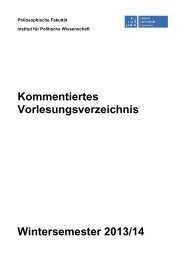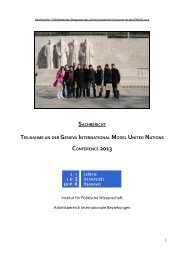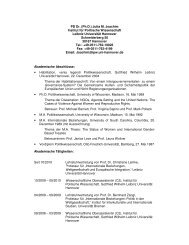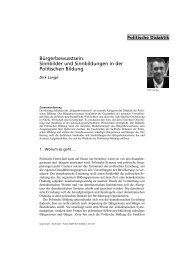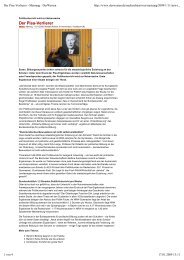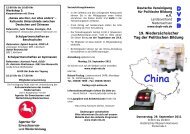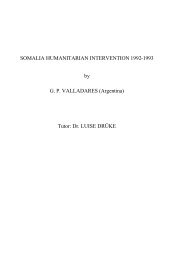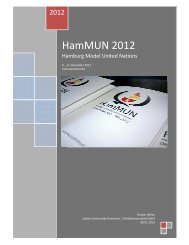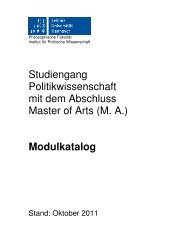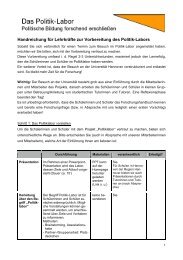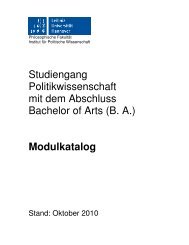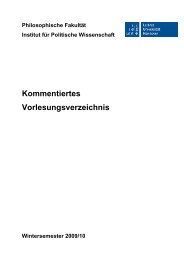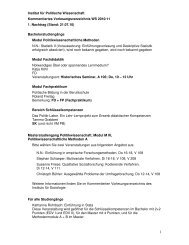Preventive Action for Refugee Producing Situations
Preventive Action for Refugee Producing Situations
Preventive Action for Refugee Producing Situations
Create successful ePaper yourself
Turn your PDF publications into a flip-book with our unique Google optimized e-Paper software.
140 Chapters<br />
authorities, having first in<strong>for</strong>med the Executive Committee of the UN<br />
High Commisioner's Program in a specially convened meeting on July 24,<br />
1974 about it, and obtained the concurrence of the Secretary-General.335<br />
with official blessing, UNHCR opened a Regional Office in Vientiane,<br />
Laos in October 1974 and a Branch Office in Hanoi in June 1975 to<br />
implement its programs.<br />
Why did the U.N. not get involved earlier? For one thing, no U.N.<br />
body had a specific mandate to intervene in a country on behalf of internally<br />
displaced nationals. Only the U.N. Secretary-General, on the basis<br />
of Article 99 of the U.N. Charter, had the authority to launch a major relief<br />
operation within a country's borders, as U Thant had done in 1971-72<br />
during Bangladesh war of independence. In the case of Vietnam, the insurmountable<br />
obstacle to U.N. action to contain the human suffering was<br />
the absolute opposition of the major powers involved, particularly the<br />
U.S., which would accept no interference in a conflict that it considered<br />
central to its national interest.<br />
But it cannot have been the original intent of the drafters of the U.N.<br />
Charter and other pertinent instruments that situations harming millions of<br />
people should be ignored by the United Nations simply because they take<br />
place within a country, whereas less serious situations between two<br />
countries come under their competence. In real life, human misery does<br />
not stop at international borders or with the Convention-defined refugees.<br />
Today, the plight of displaced persons, whether within or outside their<br />
national territory, exceeds by far the number of persons recognized as refugees.<br />
If the people are affected by power politics beyond their control,<br />
and seem unable to enjoy minimal standards of treatment within their<br />
country, then the United Nations should exercise its international moral<br />
responsibility by providing at least humanitarian, and perhaps also economic,<br />
assistance.<br />
International humanitarian assistance might help to alleviate the conditions<br />
that caused a number of people to flee or to be uprooted. The<br />
Secretary-General's good offices might be usefully employed as a facesaving<br />
device <strong>for</strong> reluctant governments by which the<br />
lion Policies and Programmes: A World Survey, Department of International<br />
Economic and Social Affairs, Population Studies, No. 80, (New York: United<br />
Nations, 1982), p. 94.<br />
335 The program included agricultural and small-scale industrial projects, support<br />
<strong>for</strong> rural health facilities, and educational projects. See Kumin, p. 41<br />
Analytical Discussion 141<br />
United Nations, through the physical presence and activities of the<br />
Secretary-General, could move into situations where other U.N. organs<br />
would not be acceptable. 336<br />
Even where international peace is not directly at stake, but simple human<br />
suffering occurs on such a large scale that it becomes an issue of public<br />
domain, the Secretary-General has the authority to intervene. Former<br />
Secretary-General U Thant indicated that it might be<br />
useful to add an Article 99(a) [to the U.N. Charter,] which would authorize the<br />
Secretary-General to bring to the attention of the membership global threats to<br />
human well-being other than those to peace and security.... I have, on my own<br />
initiative and without any supporting resolution from any United Nations organ,<br />
launched two relief operations which are concerned with millions of people.... to<br />
fill the gap until more regular arrangements can be made. 337<br />
The big powers now seem to be more inclined to accept a more active<br />
United Nations role - implicitly yielding some concessions in their stance<br />
on domestic jurisdiction - precisely because they seem to more willing to<br />
explore paths to disengagement from their costly and complicated regional<br />
conflicts. The 1988 peace ef<strong>for</strong>ts and actual agreements in Central America,<br />
Afghanistan, Iran and Iraq, Angola, and the Western Sahara are indicators<br />
of this hopeful trend. 338<br />
Both superpowers seem to be reaching a point where they favor a political<br />
agreement over military intervention. That is where multilateral<br />
mediation and negotiation might then acquire new momentum in international<br />
relations. Dialogues and negotiation would help millions of refugees<br />
and displaced persons to take control of their future, by giving them<br />
the free choice of either returning home or staying in their countries of<br />
asylum. These international actions would not only address the conditions<br />
that produce refugees, but also help bring about changes so that those who<br />
are currently refugees can emerge from that condition.<br />
_________________________________________<br />
336 Bertram Ramcharan, The Humanitarian Good Offices in International Law:<br />
Good Offices of the United Nations Secretary-General in the Field of Human<br />
Rights (The Hague: Martinus Nijhoff, 1983), p. 54.<br />
337 Ramcharan, The Humanitarian Good Offices in International Law, p. 52.<br />
338 Stanley Hoffmann, "Lessons of a Peace Epidemic," The New York Times, 6<br />
September 1988.



